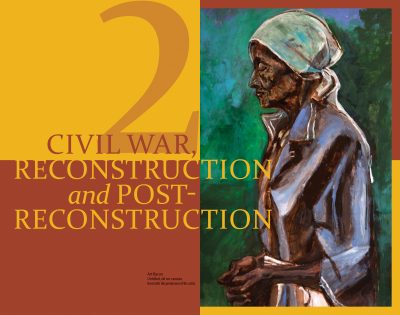Civil War, Reconstruction and Post-Reconstruction

By Martha Bouyer
Following the Civil War, slavery was replaced by its evil twin, debt peonage. This system of owning the labor of another person was just as bad as slavery. At any given time, men, women, boys, and girls could be arrested by local law enforcement officers on real or imagined charges and shipped off to work at local plantations, coal mines, steel, and iron industries, for city and county governments, and even as servants for local families.
At the end of the Civil War, former enslaved people found themselves in a “Catch 22” situation. Freedom came with responsibilities that many of the former enslaved people found difficult to maneuver for a variety of reasons. Decisions such as: Where will I live? How do I support myself or my family? What do I do with freedom?
In many communities, those questions were answered for them by repressive laws contained in the Alabama Constitution. Examples of those laws are listed below and make it clear that the laws were not intended to ensure equal treatment in a court of law. “Black behavior” was criminalized and every action could be deemed as illegal. Unable to pay fines and court costs, many of those arrested were found guilty and forced to work off their “debt” to society under difficult situations. Of particular interest are the laws that allowed people of privilege to own the labor and wages of others and to even arbitrarily take children of African American descent from their parents on the pretense of providing apprenticeships.
No. 100 To prevent persons from interfering so as to induce laborers or servants to abandon their contract, or employ such without the consent of their original employer before the expiration of the contract . . .
|
SECTION 1. Be it enacted by the Senate and House of Representatives of the State of Alabama in General Assembly convened, That it shall not be lawful for any person to interfere with, hire, employ or entice away or induce to leave the service of another, any laborer or servant, who shall have stipulated or contracted in writing, to serve for any given number of days, weeks or months, or for one year, so long as the said contract shall be and remain in force and binding upon the parties thereto, without the consent of the party employing or to whom said service is due and owing in writing or in the presence of some veritable white person, . . . Approved, February 16, 1866. |
Unlawful to interfere with laborers or servants. Penalties for enticing. |
| No. 103 | AN ACT |
| To amend Section 1215 of the Code relating to Apprentices. | |
|
SECTION 1. Be it enacted by the Senate and House of Representatives of the State of Alabama in General Assembly convened, That section 1215 of the Code which reads as follows: “The judge of probate of each county may bind out as apprentices the children of any person unable to provide for their support, until the age of twenty-one years if a male, and sixteen years if a female,” be amended by striking out sixteen in said section and inserting eighteen. Approved, December 15, 1865 |
Extension for apprentices. |
| No. 112 | AN ACT |
| Concerning vagrants and vagrancy. | |
|
SECTION 1. Be it enacted by the Senate and House of Representatives of the State of Alabama in General Assembly convened, That the commissioners’ court of any county in this State may purchase, rent, or provide such lands buildings and other property as may be necessary for a poor house, or house of correction for any such county, and may appoint suitable officers for the management thereof, and make all necessary by-laws, rules and regulations or the government of the inmates therefore, and cause the same to enforced: but in no case shall the punishment inflicted exceed hard labor, either in or out of said house; the use of chain-gangs, putting in stocks, if necessary, to prevent escapes; such reasonable correction as a parent may inflict upon a stubborn, refractory child; and solitary confinement for not longer than a week , on bread and water; and may cause to be hired out such as a vagrants, to work in chain-gangs or otherwise, for the length of time for which they are sentenced . . . |
Establishment of poor-house. |
Chapter 2 overview from The Future Emerges from the Past, Celebrating 200 Years of Alabama African American History & Culture.
Cover Image: Art Bacon, Untitled, oil on canvas. Used with permission of the artist.

